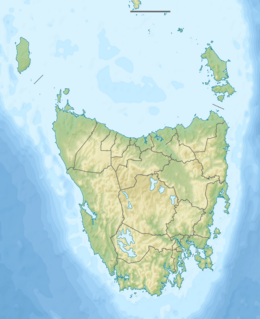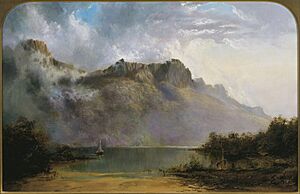Mount Olympus (Tasmania) facts for kids
Quick facts for kids Mount Olympus |
|
|---|---|
 |
|
| Highest point | |
| Elevation | 1,472 m (4,829 ft) |
| Prominence | 592 m (1,942 ft) |
| Isolation | 6.35 km (3.95 mi) |
| Geography | |
| Location | Tasmania, Australia |
Mount Olympus is a tall mountain located in Tasmania, Australia. It is part of the beautiful Cradle Mountain-Lake St Clair National Park. This mountain stands at 1,472 meters (about 4,829 feet) above sea level, making it the 24th highest mountain in Tasmania. You can find it about 8 kilometers (5 miles) southeast of Mount Gould and 4 kilometers (2.5 miles) west of Lake St. Clair.
History of Mount Olympus
In 1835, a person named George Frankland climbed this mountain. He was the one who gave it the name Mount Olympus.
Artistic Views of Mount Olympus
Mount Olympus has inspired artists for many years. The famous Australian landscape painter, William Charles Piguenit, created a painting of it. This artwork was bought by the Art Gallery of New South Wales in 1875.
It was a very important purchase for the gallery. It was their first oil painting ever bought. It was also the first painting by an Australian-born artist that the gallery owned. People even helped pay for it through public donations. Another painting of Mount Olympus by Piguenit is kept at the National Library of Australia.
Plants and Trees on Mount Olympus
Mount Olympus is home to a special tree called Nothofagus gunnii. This tree was first found here in 1847 by Ronald Campbell Gunn. It is Australia's only tree that loses its leaves in winter due to cold weather.
You can mostly find these trees in areas higher than 800 meters (about 2,625 feet). These areas also get a lot of rain, usually more than 1,800mm (70 inches) each year. The presence of Nothofagus gunnii is a clue that the land was once part of a supercontinent called Gondwana.
 | Isaac Myers |
 | D. Hamilton Jackson |
 | A. Philip Randolph |



